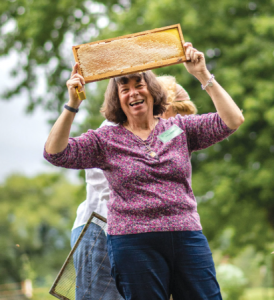
Sourwood Honey from Clarkesville, Georgia Awarded Best Tasting Honey in the World
Second time winner of Best Tasting Honey in the World, sponsored by the Center for Honeybee Research in Asheville, NC.
This is the second time that Virginia Webb has won the title of “Best Tasting Honey in the World” at the Center for Honeybee Research. She has also won four gold medals for her Sourwood honey at the Apimondia World Honey Show, which is held every two years.
The United States boasts a wide variety of artisanal honeys, ranging from well-known varieties like clover honey to more unique ones, such as tupelo, black sage, fireweed, orange blossom, gallberry, basswood, and sourwood. The flavor of honey is primarily determined by the flowers that the bees visit.
The sourwood tree (Oxydendrum arboreum), is native to North America, which is also called the Lily of the Valley Tree or the Appalachian Lily tree. It grows to be 40 to 60 feet tall with a one-foot diameter. It is found in the mountains of northern Georgia, the Shenandoah Valley of Virginia, and Tennessee, Kentucky, and West Virginia. Sourwood honey ranges in color from extra light to light amber. It is extremely aromatic and has a rich, distinctive honey flavor. It commands a premium price in local markets.
Mrs. Webb is the only person in the United States with three Master Beekeeping certifications. A third-generation beekeeper, she has been keeping bees for over 60 years, ever since her father gave her a hive in 1963. While growing up in East Tennessee, she was the first winner of the Tennessee 4-H Beekeeping project. For many decades, teaching others about beekeeping has been Virginia’s passion.
Her honey has been served at The White House in Washington, D.C., at the Georgia Governor’s Mansion, at the United Nations in New York City, and at Le Cordon Bleu, among other esteemed places.
She met her late husband, Carl Webb, through beekeeping and together they started a commercial beekeeping operation in Clarkesville, Georgia, in 1998.
Beekeeping can be found in almost every area of the United States. It ranges from urban areas, such as downtown Atlanta, to suburban areas and the rich farmlands of Georgia.
The U.S. Department of Agriculture reports that honeybees pollinate over $15 billion worth of crops in the United States each year. Over 80% of flowering plants require pollinators for reproduction. One out of every three bites of food we eat, including fruits, vegetables, chocolate, coffee, and nuts, is made possible by beneficial pollinators.
The Center for Honeybee Research cares about all pollinators, not just honeybees. They educate the public about the importance of pollinator gardens and using fewer chemicals in yards to provide habitats for insects. While many insects, birds, and bats provide pollination services, honeybees have become crucial to the agricultural industry. To produce one pound of honey, bees must visit over two million flowers. That is the power of the honeybee!
To find out more information on the Center for Honeybee Research go to: https://centerforhoneybeeresearch.org
Virginia Webb
MtnHoney
+1 7069685670
email us here
Distribution channels: Agriculture, Farming & Forestry Industry
Legal Disclaimer:
EIN Presswire provides this news content "as is" without warranty of any kind. We do not accept any responsibility or liability for the accuracy, content, images, videos, licenses, completeness, legality, or reliability of the information contained in this article. If you have any complaints or copyright issues related to this article, kindly contact the author above.
Submit your press release
